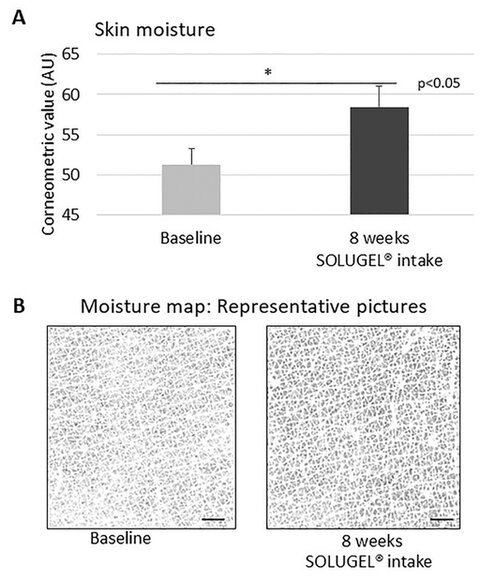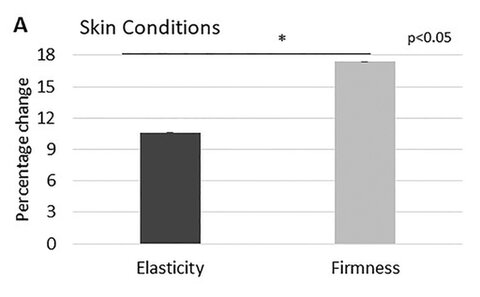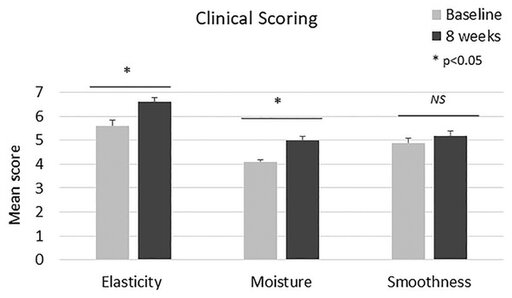Collagen
Effect of collagen peptides intake on skin conditions:
a clinical trial
Telma Garcia1, Stephan Dierckx2, Yingying Wu1,
Milagros Patrizi1, Erwin Quanten1¥, Reyhan Nergiz Unal1,2*
*Corresponding author
1. PB Leiner, part of Tessenderlo Group, Brussels, Belgium
2. Tessenderlo Innovation Center, Tessenderlo Group NV, Brussels, Belgium
¥. Retired

KEYWORDS
Collagen peptides
Skin anti-aging
Hydration
Firmness
Elasticity
Abstract
Collagen is particularly important for the strength and resilience of the skin. Therefore, the aim of the study was assessment of the effect of collagen peptides ingestion on skin hydration, elasticity, and firmness. A clinical study was conducted on the effect of collagen peptides ingestion. Skin hydration by the Corneometer®; firmness and elasticity by the Cutometer® and clinical scoring by a dermatologist were measured. The oral intake of 10g/day collagen peptides for 56 days has a significant increase in the moisturizing and the biomechanical properties of the skin, such as firmness and elasticity. Collagen peptide intake may offer solutions to wrinkle formation and skin aging.
Introduction
Collagen is the most abundant protein in the human body and a major protein in the skin’s structure (1). Collagen represents 35% of the total proteins in the body and is synthesized by specific cells called fibroblasts and provides the adhesion, elasticity and regeneration of the tissue that is assembled in connective tissues (2). Skin properties are conferred by its particular architecture, resulting in the interactions between the extracellular matrix and the fibroblast cells, allowing both the synthesis and the degradation of the matrix components such as collagen for hydration, elasticity and firmness of the skin (3).
The structure, integrity and appearance of the skin are affected by various environmental factors (ultraviolet radiation, nutrition, etc.) and especially chronological aging (4). During chronological aging, all the layers of the skin (epidermis, dermis and hypodermis) undergo modifications (5, 6). Within the dermis, the fibroblast density declines, which leads to reduced synthesis of matrix elements (7). Oral collagen supplements have been proposed to modulate skin functions and can, therefore, be useful in the treatment of skin aging (8). A small amount of accumulating clinical studies have shown that, in addition to a healthy and balanced life, oral hydrolyzed collagen can improve skin aging. This supplementation stimulates the growth of fibroblasts, which are responsible for the collagen synthesis, and, in addition, the elastin and hyaluronic acid synthesis that would allow for improving skin moisture and less wrinkle formation (9, 10).
Collagens are particularly important for the strength and resilience of the skin (3, 11). Collagen was shown in preclinical studies to improve skin barrier function, which induces the synthesis of collagen and hyaluronic acid and promotes the growth and migration of fibroblasts (12, 13). Notwithstanding this, changes in the amount and structure of collagen in the skin may be responsible for wrinkle formation, loss of skin elasticity, and hydration 14, 15). Various supplements containing collagen peptides are claimed to have skin anti-aging properties; however, there are a limited number of human studies supporting each of these claims for collagen hydrolysate alone (16, 17). There is still a gap in research to fill the effectiveness of supplemented hydrolyzed collagen alone on skin biophysical parameters related to cutaneous aging. Therefore, the aim of the study was the in vivo assessment of the effect of the daily intake of hydrolyzed collagen composed of collagen peptides alone as a bioactive ingredient, on skin moisture-related skin properties (hydration), and on biomechanical properties (elasticity and firmness) of the skin in a clinical study design.
Materials and methods
Subject inclusion and exclusion criteria
This study was a blinded randomized and mono-centered clinical trial. The sample size was estimated by power analysis of means. Healthy 29 Caucasian women for each group aged 35–55 years (mean age: 45.34 years) with average body weight (mean weight: 58.9kg) were recruited based on the inclusion/exclusion criteria. A total of 58 participants were enrolled and 54 concluded the study.
Inclusion criteria were Fitzpatrick skin phototypes II and III, body mass index from 18 to 25kg/m2, the presence of wrinkles on the face, crow’s feet with a grade ranging between ≥ 2 and < 5 (18). the presence of dry skin on the face (corneometric index range between 30UA and 50UA at the level of one cheekbone) and no applied body care products. Exclusion criteria were pregnancy, smokers, diabetics, those addicted to alcohol or other narcotic drugs, history of adverse reaction to cosmetics, systemic diseases, auto-immune disease, skin disease and the use of any cosmetics or supplementation during the study.
Study manipulation period
The study was approved by the independent French Ethics Committee, Les Comités de protection des personnes (CPP) and authorized by the French competent authority, l’Agence nationale de sécurité du médicament et des produits de santé (ANSM). The recruitment of the subjects was performed through the COSderma laboratory’s database and declared to the CNIL under number 1015566. Each subject participating in the test was fully informed and gave informed consent in accordance with the last revision of the Declaration of Helsinki . The study was carried out by the contract research organization Les Laboratoires COSderma (Bordeaux, France), in cooperation with the Dermatology Unit at Hôpital Saint-André (Bordeaux, France) and in accordance with the regulatory requirements (International Conference on Harmonization [ICH] Good Clinical Practices [GCP] (ICH Topic E6 ref: CPMP/ICH/135/95).
This study was performed for a duration of 10 weeks: a pre-participation period (wash-out period) of 2 weeks, followed by 8 weeks of collagen peptide supplementation period. One sachet of instant powder beverage containing 10g/day of SOLUGEL® collagen peptides or 10g/day maltodextrin was taken once in the evening before bedtime. SOLUGEL® pure collagen peptides is an instant powdered product that is fit for human consumption, manufactured by PB Leiner (Part of Tessenderlo Group, Belgium) according to a production process and in respect of specific hygiene rules that are compliant with the European Regulation (EC) n° 853/2004. SOLUGEL® collagen peptides is produced from collagenous tissues by hot water extraction. After certain purification steps, the collagen goes through a a highly controlled standardized enzymatic hydrolysis process to end up with a molecular weight between 0.3 and 8 kDa and with an average molecular weight of 2-3kDa. Collagen peptides are characterized by a high content of glycine (23-24%), hydroxyproline (12-13%), proline (13-14%), glutamic Acid (9-10%), arginine (7-8%), and alanine (8-9%).
The assessment of the hydration of the upper layers of the epidermis by capacitance measurements
The hydration level of the upper layers of the epidermis on one cheekbone was assessed with the Corneometer® CM 825. The capacitance of the system (electrodes and upper skin layers) was influenced by changes in the dielectric constant of the skin surface. The dielectric properties of the medium and, consequently, the capacitance of the system, were modified when the hydration level of the stratum corneum varied (19).
The assessment of the hydration of the cutaneous surface by illustrative acquisitionsThe hydration level of the upper layers of the epidermis was assessed using the Moisture Map. In addition to the Corneometer® measurements of hydration, quantitative Moisture Map analysis was performed. With this analysis, the distribution of water could be shown (9, 10). The measurements were performed by the responsible technician on one randomly chosen forearm at baseline and after 8 weeks of collagen peptide intake. Illustrative pictures were taken to show the hydration of the skin.
The assessment of the biomechanical properties of the skin
The biomechanical properties of the skin were measured by cutometric measurements (Cutometer®) on one temple. Briefly, the principle of measurement was based on the suction and the strain. This method allows the firmness, elasticity and tonicity of the skin to be measured (20, 21).
The assessment of the cutaneous state by clinical scoring
The clinical scoring consisted of a visual and tactile assessment of the cutaneous state at the level of the face, before and after the intake of collagen peptides, to determine its cosmetic efficacy. In order to be as accurate as possible and always under the same intensity of light, some landmarks were set in the examination room so that the subject would be installed in the same position as at baseline (19).
Statistical analysis
Statistical analysis was performed with SPSS (Statistical Analysis Software Inc., Chicago, IL, USA) by the COSderma laboratory. Homogeneity between groups at baseline was tested by ANOVA, followed by a Tukey or Dunnett’s post hoc test for multiple comparisons. Statistical significance was considered when p<0.05.
Results
The effect on the hydration of the upper layers of the epidermis by capacitance measurements
The hydration effect was assessed by capacitance measurements, using a Corneometer®. After 8 weeks of oral intake of SOLUGEL® collagen peptides, there was a statistically significant increased moisturizing effect of 14% (58.4 AU) compared to baseline (51.3 AU) (Figure 1A). A scan was taken from a fixed area of the skin and processed to illustrate the moisture level, which was expressed in a moisture map. The effect on the skin hydration of the daily intake of 10g of SOLUGEL® collagen peptides and its moisturizing effect could also clearly be seen as illustrated in figure 1B for one particular subject that showed an increase in the corneometric measurements.

Figure 1. Effect of oral intake of collagen peptides on the hydration of the upper layers of the epidermis. (A) The moisture level of the upper layers of the epidermis at baseline and after 8 weeks of supplementation were assessed using the Corneometer® (AU: arbitrary units); (B) Representative pictures of the upper layers of the epidermis were assessed using the moisture map technique. The data was presented as mean ± standard deviation (X̅ ± SD). * Refers to statistically significant difference (p<0.05). NS: not significant (p>0.05).
The effect on the biomechanical properties of the skin
The biomechanical properties of the skin, such as elasticity and firmness, were assessed by Cutometer® measurements. The firmness (Ur/Uf) values were in baseline 0.24±0.04 (collagen peptides) and 0.25±0.06 (placebo); after 8 weeks supplementation they were 0.27±0.05 (collagen peptides) and 0.24±0.02 (placebo). The net elasticity (Ur/Ue) values were in baseline 0.36±0.07 (collagen peptides) and 0.39±0.10 (placebo); after 8 weeks supplementation 0.42±0.08 (collagen peptides) and 0.39±0.05 (placebo). The data at baseline and after 8 weeks of intake of 10g of SOLUGEL® collagen peptides were compared to clarify the collagen peptide supplementation effect. The calculation of the percentage change from baseline after 8 weeks of supplementation is shown in figure 2. The skin firmness and skin elasticity were significantly improved after 8 weeks of collagen peptide supplementation compared to baseline (Figure 2).

Figure 2. Effect of oral intake of collagen peptides on biomechanical properties. The properties such as elasticity and firmness of the skin at baseline and after 8 weeks of supplementation were measured using a Cutometer®. The calculation of the percentage of change from baseline after 8 weeks of supplementation is shown in the figure. The data was presented as percentage (%). * Refers to statistically significant difference (p<0.05). NS: not significant (p>0.05).
The effect on the cutaneous state by clinical scoring
The result for the clinical scoring of elasticity and moisturized aspect of the skin shows a clear effect of collagen peptides for 8 weeks. The mean score for skin elasticity (p<0.001), moisture (p<0.001) and smoothness (p>0.05) were 5.6, 4.1 and 4.9 at baseline and 6.6, 5.0 and 5.2 after 8 weeks supplementation respectively. Data showed a significant improvement of skin elasticity by more than 17.1%. A similar observation can be made for the moisturized aspect of the skin with an increase of nearly 20.6% (Figure 3).

Figure 3. Clinical scoring of the effect of oral intake of collagen peptides. Clinical scoring of the effect on elasticity, moisture and smoothness of the skin. The clinical scoring was performed by the expert dermatologist on the face using a scale scored in 10 points (from 0 to 9). The data was presented as mean ± standard deviation (X̅ ± SD). * Refers to statistically significant difference (p<0.05). NS: not significant (p>0.05).
The self-assessment of the efficacy perceived by the subjects and product evaluation
At the end of the study (which lasted 8 weeks), the subjects completed a self-assessment questionnaire to measure the skin improvement as felt by the subjects. Overall, all of the products were well accepted with no differences in appreciation of the drinks with 10g of SOLUGEL® collagen peptides. More than half of the volunteers taking collagen peptides demonstrated a better perception of the product efficacy in terms of skin hydration, firmness of the skin, the appearance of the skin, as well as the overall improvement of the state and aspect of the skin. This further confirms the results of the measurements as described above.
Discussion
Collagen is the main component in the structure of human skin, and it is proposed that changes in its quantity and structure are responsible for skin aging. The increase of the collagen in the skin layers would enable a better construction of the extracellular matrix to ultimately allow biomechanical improvements of the skin (5, 7, 11). The intake of collagen peptides, which has been claimed to have effects on wrinkle formation and skin aging, requires more attention in science (4, 11, 22).
Collagen, which is the extracellular connective tissue matrix component, is particularly important for the strength and resilience of the skin (4). With age, there is a loss of collagen fibers implicated in diminished moisture, resulting in vulnerable skin for the dynamics of the overall skin structure. In this context, in our study, a higher level of the hydrating effect of collagen peptides (10g/day of SOLUGEL®) after 8 weeks of intake was determined by capacitance measurements and scans from the skin to illustrate the moisture level (p<0.05). Objective clinical evaluation by the dermatologist showed comparable hydration affected by collagen peptides (p<0.05). Our results are in line with two recent studies that have directly shown an induction of skin moisture improvement in response to oral collagen peptide administration (10g/day for 8 weeks) (23, 24). On the other hand, in another current study, moisture content was not changed after CP ingestion (5g/day) for 8 weeks (16). In addition, as was the case in our study, there is a study that determines the skin condition in terms of aspects other than hydration. However, this showed the overall skin firmness and elasticity effect of 10g/day CP intake when used for a period of 4 weeks longer than our study (the other study lasted a total of 12 weeks) (25). Regarding the human skin’s physiology, cutaneous water content (moisture) is known to play an important role in skin barrier/envelope function, and a lack of hydration of the skin may be associated with several dermatological dysfunctions besides wrinkles.
Aging damages the elastic capacity of the skin, and thus, aging skin is marked by a lack of elasticity, fragmentation, and collagen bundle fragility (6). In order to look further into the impact of this collagen peptide ingestion on the skin’s physiology, we also assessed firmness and elasticity to detect improvements in the plasticity of the skin. The skin firmness and elasticity were improved after 8 weeks of intake of collagen peptides (10g/day of SOLUGEL® collagen peptides) compared to baseline (p<0.05). An objective clinical evaluation by the dermatologist showed that the elasticity of the skin was affected by collagen peptides for 8 weeks (p<0.05). Our results are in line with one recent study that measured skin elasticity in sun-exposed areas of only post-menopausal women after 4 weeks of collagen ingestion (17). In parallel, another current study determined that skin elasticity was improved after collagen peptides ingestion for 8 weeks (16). Based on the accumulated data, it can be assumed that the most prominent physiological changes in aging are localized in the dermis and result from the metabolism of collagen fibers.
Collagen peptide supplementation has been proposed to be effective in a better construction of the extracellular matrix (13), cutaneous thickening (24), and an improvement of biomechanical properties such as firmness (12), elasticity (24) as well as skin moisture (9) in a couple of studies. However, there are studies in which some of these parameters were not affected statistically by collagen intake (16, 23, 25). These conflicting data may be due to characteristics of study design, duration, and collagen dosage, proving the need for more human studies.
There is a limited amount of clinical research on the mechanism of collagen peptides on skin improvements (26, 27). Some preclinical studies have demonstrated the effect of collagen peptides on fibroblasts (13, 14). One hypothesis of mechanical action in collagen peptides may be recognized by the cells as a marker of the degradation of endogenous collagen. In response to this "degradation" signal, cells such as fibroblasts produce collagen (28). These cells originate from the same stem cells and share certain characteristics, such as the capacity to produce endogenous collagen (13, 14, 28). Therefore, it has been demonstrated through in vitro studies that collagen peptides can stimulate collagen production by such cells. This needs to be confirmed by the human study design to extrapolate this data on skin health benefits.
Conclusion
Collagen peptides have been known for offering various health benefits since the 1980s. Numerous scientific studies have introduced the beneficial effects of collagen peptides on weight management, joint health, bone health, physical activity and exercise recovery, wound healing, as well as skin health. This is a clinical study suggesting the beneficial effect of pure SOLUGEL® collagen peptides on skin condition. The benefits of taking a daily dosage of 10g/day collagen peptides for 56 days are seen in the significant improvement of skin condition aspects such as hydration, firmness, and elasticity. Collagen peptides may improve skin health and offer a solution to skin aging.
Authorship
All the authors were involved in the design of the study, collection and analyzing the data, and finalizing of the manuscript. All authors read and approved the final manuscript.
Acknowledgment
We would like to thank Marion Potier, who worked at PB Leiner from 2013-2017 for leading the study. We would also like to thank Professor Alain Taieb and Dr. Emilia Bucur from Hôpital Saint-André for the data collection; COSderma Team and Laboratory for the study design and analysis; Dr. Carlos Castells for leading the study.
Disclosure statement
The study was performed at COSderma Laboratory (France). The nutricosmetical supplement used in this study, SOLUGEL collagen peptides was provided by PBLeiner, part of a Tessenderlo Group. The authors certify that there is no conflict of interest regarding the material discussed in this manuscript. The study funded by Tessenderlo Group NV (Brussels, Belgium).



References and notes
- Solano F. Metabolism and Functions of Amino Acids in the Skin. Adv Exp Med Biol. 2020;1265:187-99. https://www.ncbi.nlm.nih.gov/pubmed/32761577
- Sato K. The presence of food-derived collagen peptides in human body-structure and biological activity. Food Funct. 2017;8(12):4325-30. https://www.ncbi.nlm.nih.gov/pubmed/29114654
- Yousef H, Alhajj M, Sharma S. Anatomy, Skin (Integument), Epidermis. StatPearls. Treasure Island (FL)2021. https://www.ncbi.nlm.nih.gov/books/NBK470464/
- Kathryn J. Martires PF, Cooper AMPKD, Baron ED. Factors That Affect Skin Aging. Arch Dermatol. 2009;145(12):1375-9. https://pubmed.ncbi.nlm.nih.gov/20026845/
- Tobin DJ. Introduction to skin aging. J Tissue Viability. 2017;26(1):37-46. https://www.ncbi.nlm.nih.gov/pubmed/27020864
- Fisher GJ, Kang S, Varani J, Bata-Csorgo Z, Wan Y, Datta S, et al. Mechanisms of photoaging and chronological skin aging. Arch Dermatol. 2002;138(11):1462-70. https://www.ncbi.nlm.nih.gov/pubmed/12437452
- Puizina-Ivi N. Skin aging. Acta Dermatoven APA. 2008;17(2):47-54. https://pubmed.ncbi.nlm.nih.gov/18709289/
- Jhawar N, Wang JV, Saedi N. Oral collagen supplementation for skin aging: A fad or the future? J Cosmet Dermatol. 2020;19(4):910-2. https://www.ncbi.nlm.nih.gov/pubmed/31411379
- Nomoto T, Iizaka S. Effect of an Oral Nutrition Supplement Containing Collagen Peptides on Stratum Corneum Hydration and Skin Elasticity in Hospitalized Older Adults: A Multicenter Open-label Randomized Controlled Study. Adv Skin Wound Care. 2020;33(4):186-91. https://www.ncbi.nlm.nih.gov/pubmed/32195722
- Bolke L, Schlippe G, Gerss J, Voss W. A Collagen Supplement Improves Skin Hydration, Elasticity, Roughness, and Density: Results of a Randomized, Placebo-Controlled, Blind Study. Nutrients. 2019;11(10). https://www.ncbi.nlm.nih.gov/pubmed/31627309
- Lupu MA, Gradisteanu Pircalabioru G, Chifiriuc MC, Albulescu R, Tanase C. Beneficial effects of food supplements based on hydrolyzed collagen for skin care (Review). Exp Ther Med. 2020;20(1):12-7. https://www.ncbi.nlm.nih.gov/pubmed/32508986
- Zhang L, Zhang S, Song H, Li B. Ingestion of collagen hydrolysates alleviates skin chronological aging in an aged mouse model by increasing collagen synthesis. Food Funct. 2020;11(6):5573-80. https://www.ncbi.nlm.nih.gov/pubmed/32520042
- Zague V, do Amaral JB, Rezende Teixeira P, de Oliveira Niero EL, Lauand C, Machado-Santelli GM. Collagen peptides modulate the metabolism of extracellular matrix by human dermal fibroblasts derived from sun-protected and sun-exposed body sites. Cell Biol Int. 2018;42(1):95-104. https://www.ncbi.nlm.nih.gov/pubmed/28906033
- Edgar S, Hopley B, Genovese L, Sibilla S, Laight D, Shute J. Effects of collagen-derived bioactive peptides and natural antioxidant compounds on proliferation and matrix protein synthesis by cultured normal human dermal fibroblasts. Sci Rep. 2018;8(1):10474. https://www.ncbi.nlm.nih.gov/pubmed/29992983
- Song H, Zhang S, Zhang L, Li B. Effect of Orally Administered Collagen Peptides from Bovine Bone on Skin Aging in Chronologically Aged Mice. Nutrients. 2017;9(11). https://www.ncbi.nlm.nih.gov/pubmed/29099747
- Proksch E, Segger D, Degwert J, Schunck M, Zague V, Oesser S. Oral supplementation of specific collagen peptides has beneficial effects on human skin physiology: a double-blind, placebo-controlled study. Skin Pharmacol Physiol. 2014;27(1):47-55. https://www.ncbi.nlm.nih.gov/pubmed/23949208
- Sangsuwan W, Asawanonda P. Four-weeks daily intake of oral collagen hydrolysate results in improved skin elasticity, especially in sun-exposed areas: a randomized, double-blind, placebo-controlled trial. J Dermatolog Treat. 2020:1-6. https://www.ncbi.nlm.nih.gov/pubmed/32009486
- Bazin R. and Doublet E. Skin Aging Atlas, Medcom Vol. 1, 2007 p. 41 SKIN AGING ATLAS – Volume 1 : Caucasian type - Santé Animale - Medcom
- Qassem M, Kyriacou P. Review of Modern Techniques for the Assessment of Skin Hydration. Cosmetics. 2019;6(1). https://www.mdpi.com/2079-9284/6/1/19
- Ryu HS, Joo YH, Kim SO, Park KC, Youn SW. Influence of age and regional differences on skin elasticity as measured by the Cutometer. Skin Res Technol. 2008;14(3):354-8. https://www.ncbi.nlm.nih.gov/pubmed/19159383
- Ahn S, Kim S, Lee H, Moon S, Chang I. Correlation between a Cutometer and quantitative evaluation using Moire topography in age-related skin elasticity. Skin Res Technol. 2007;13(3):280-4. https://www.ncbi.nlm.nih.gov/pubmed/17610649
- de Miranda RB, Weimer P, Rossi RC. Effects of hydrolyzed collagen supplementation on skin aging: a systematic review and meta-analysis. Int J Dermatol. 2021.
https://www.ncbi.nlm.nih.gov/pubmed/33742704
- Hiroki Ohara̮, Kyoko Ito, Hiroyuki Iida, Matsumoto H. Improvement in the Moisture Content of the Stratum Corneum Following 4 Weeks of Collagen Hydrolysate Ingestion. Nippon Shokuhin Kagaku Kogaku Kaishi 2009;56(3):137-45. https://www.jstage.jst.go.jp/article/nskkk/56/3/56_3_137/_article/
- Asserin J, Lati E, Shioya T, Prawitt J. The effect of oral collagen peptide supplementation on skin moisture and the dermal collagen network: evidence from an ex vivo model and randomized, placebo-controlled clinical trials. Journal of Cosmetic Dermatology. 2015;14(4):291-301. https://www.ncbi.nlm.nih.gov/pubmed/26362110
- Evans M, Lewis ED, Zakaria N, Pelipyagina T, Guthrie N. A randomized, triple-blind, placebo-controlled, parallel study to evaluate the efficacy of a freshwater marine collagen on skin wrinkles and elasticity. J Cosmet Dermatol. 2021;20(3):825-34. https://www.ncbi.nlm.nih.gov/pubmed/32799362
- Laing S, Bielfeldt S, Ehrenberg C, Wilhelm KP. A Dermonutrient Containing Special Collagen Peptides Improves Skin Structure and Function: A Randomized, Placebo-Controlled, Triple-Blind Trial Using Confocal Laser Scanning Microscopy on the Cosmetic Effects and Tolerance of a Drinkable Collagen Supplement. J Med Food. 2020;23(2):147-52. https://www.ncbi.nlm.nih.gov/pubmed/32017646
- Proksch E, Schunck M, Zague V, Segger D, Degwert J, Oesser S. Oral intake of specific bioactive collagen peptides reduces skin wrinkles and increases dermal matrix synthesis. Skin Pharmacol Physiol. 2013;27(3):113-9. https://www.ncbi.nlm.nih.gov/pubmed/24401291
- Yoshihiro Tokudome, Nakamura Kyosuke, Madoka Kage, Hiroaki Todo, Kenji Sugibayashi, Hashimoto F. Effects of soybean peptide and collagen peptide on collagen synthesis in normal human dermal fibroblasts. International Journal of Food Sciences and Nutrition. 2012;63(6):689-95. https://pubmed.ncbi.nlm.nih.gov/22264122/

